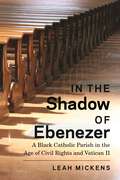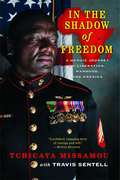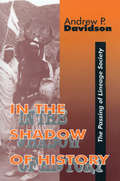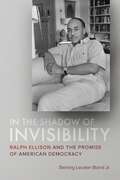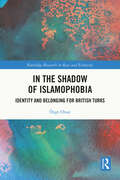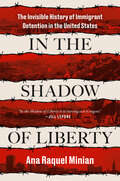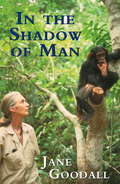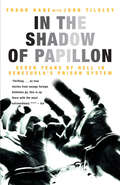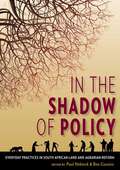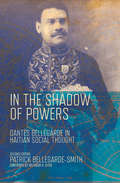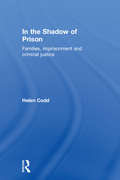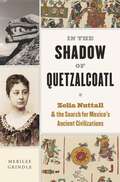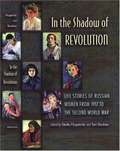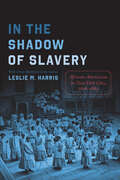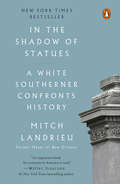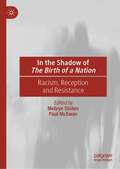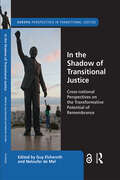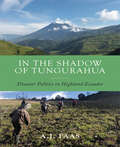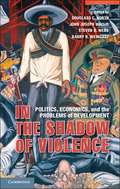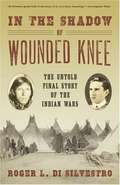- Table View
- List View
In the Shadow of Ebenezer: A Black Catholic Parish in the Age of Civil Rights and Vatican II
by Leah MickensUncovers how the Civil Rights Movement and Vatican II affected African American Catholics in Atlanta The history and practices of African American Catholics has been vastly understudied, and Black Catholics are often written off as a fringe sector of the religious population. Yet, Catholics of African descent have been a part of Catholicism since the early days of European exploration into the New World.In the Shadow of Ebenezer examines how the Civil Rights Movement and the Second Vatican Council affected African American Catholics in Atlanta, Georgia, focusing on the historic Our Lady of Lourdes Catholic Church in the Old Fourth Ward. Our Lady of Lourdes is a neighbor of major historic Black Protestant churches in the city, including Ebenezer Baptist Church, a block away, which during the Civil Rights era was the pulpit of Martin Luther King Jr. Featuring archival and oral history sources, the book examines the religious and cultural life of the parishioners of Our Lady of Lourdes Catholic Church, showing how this Black Catholic congregation fit into the overall religious ecology of the neighborhood. Examining Our Lady of Lourdes in relation to these larger Black Protestant congregations helps to illuminate whether and how they were shaped by their place at a center of the civil rights struggle, and how religious change and social change intersect.
In the Shadow of Freedom: A Heroic Journey to Liberation, Manhood, and America
by Tchicaya Missamou Travis SentellFROM POVERTY TO WEALTH, FROM AFRICA TO AMERICA, AND FROM CHILD SOLDIER TO U. S. MARINE Born into the Congolese wilderness, Tchicaya Missamou became a child soldier at age 11. As a horrific civil war loomed across his country, Tchicaya began using his militia connections to ferry jewels, cash, computers, and white diplomats out of the country. By 17, he was rich. By 18, he was a hunted man, his house destroyed, his family brutalized in front of him by his own militia. By 19, he'd left behind everything he'd ever known, escaping to Europe and, eventually, to America. Incredibly, that was only the start of his journey. In the Shadow of Freedom is the uplifting story of one man's quest to achieve the American Dream. Tchicaya Missamou's life is a shining example of why America is a gift that should not be taken for granted, and why we are limited only by the breadth of our imagination and the strength of our will.
In the Shadow of History: Passing of Lineage Society
by Andrew DavidsonFirst Published in 2018. Routledge is an imprint of Taylor & Francis, an Informa company.
In the Shadow of Illness
by Myra Bluebond-LangnerWhat is it like to live with a child who has a chronic, life-threatening disease? What impact does the illness have on well siblings in the family? The author suggests that understanding the impact of the illness lies not in the identifying deficiencies in the lives of those affected, but in appreciating how family members carry on with their lives in the face of the disease's intrusion. She looks at how parents adjust their priorities and their idea of what constitutes a normal life, how they try to balance the needs of other family members while caring for the ill child, and how they see the future. Since the issues raised are not unique to cystic fibrosis but are common to other chronic and life-threatening illnesses, this book will be of interst to all who study, care for, or live with the seriously ill.
In the Shadow of Invisibility: Ralph Ellison and the Promise of American Democracy
by Sterling Lecater Bland Jr.With In the Shadow of Invisibility, Sterling Lecater Bland Jr. offers a long-overdue reconsideration of Ralph Ellison, examining the trajectory of his intellectual thought in relation to its resonances in twenty-first-century American culture. Bland charts Ellison’s evolving attitudes on several central topics including democracy, race, identity, social community, place, and political expression. This compelling new exploration of Ellison’s legacy stresses the perpetual need to reexamine the intersections of race, literature, and American culture, with particular attention to how the democratic principle has grown increasingly urgent in the nation’s ongoing, and often contentious, conversations about race. Arguing that Ellison saw racial and social identity as being inseparable from the nation’s past and its complicated history of racial anxiety, In the Shadow of Invisibility traces the growth and transformation of Ellison’s ideas across his life and work, from his early apprentice writing that culminated in his groundbreaking first novel, Invisible Man, through the posthumous publication of his unfinished second novel, Three Days before the Shooting . . . Focused on his mythic vision of the promise of America, this book firmly situates Ellison in the sociopolitical environments from which his ideas arose, with close consideration of his published writings, including his influential essays on literature and jazz, as well as his working notes and correspondence. Bland foregrounds Ellison’s thinking on the responsibilities of Black writers to examine democratic ideals, the legacies of slavery and Jim Crow, and the impacts of civil rights movements. Interweaving biography, history, and literary criticism, and drawing from extensive archival research, In the Shadow of Invisibility reveals the extent to which Ellison’s work exposes the contradictions inherent in American culture, arguing anew for the importance and immediacy of his writings in the broader context of American intellectual thought.
In the Shadow of Islamophobia: Identity and Belonging for British Turks (Routledge Research in Race and Ethnicity)
by Özge OnayThis book explores the multifaceted experiences of British Turks, particularly focusing on how they navigate and negotiate Islamophobia in contemporary British society. It delves into the complexities of identity, ethnicity, and religion, shedding light on the unique ways in which British Turks respond to and reshape the discourses surrounding Islamophobia. By examining the intersection of Turkish secularism, national identity, and global socio-political dynamics, this book offers a nuanced understanding of how Islamophobia is both experienced and deflected within this community. Through a combination of in-depth interviews, ethnographic insights, and analysis of social discourses, the book highlights how British Turks engage in practices of passing and identity negotiation. It uncovers how these strategies are informed by broader themes such as Brexit, cosmopolitanism, and the legacy of Turkey’s relationship with Europe. This study challenges monolithic interpretations of Islamophobia, presenting a more diverse and intricate portrayal of its impact on different Muslim communities.This book is an essential resource for scholars and students of Sociology, Criminology, Cultural Studies, and Religious Studies, as well as policymakers and practitioners working in multicultural and multi-ethnic contexts. It will be of particular interest to those studying the intersections of race, religion, and identity in the Middle East and Contemporary Europe.
In the Shadow of Liberty: The Invisible History of Immigrant Detention in the United States
by Ana Raquel MinianA probing work of narrative history that reveals the hidden story of immigrant detention in the United States, deepening urgent national conversations around migration.In 2018, many Americans watched in horror as children were torn from their parents at the US-Mexico border under Trump's "family separation" policy. But as historian Ana Raquel Minian reveals in In the Shadow of Liberty, this was only the latest chapter in a saga tracing back to the 1800s—one in which immigrants to the United States have been held without recourse to their constitutional rights. Braiding together the vivid stories of four migrants seeking to escape the turmoil of their homelands for the promise of America, In the Shadow of Liberty gives this history a human face, telling the dramatic story of a Central American asylum seeker, a Cuban exile, a European war bride, and a Chinese refugee.As we travel alongside these indelible characters, In the Shadow of Liberty explores how sites of rightlessness have evolved, and what their existence has meant for our body politic. Though these "black sites" exist out of view for the average American, their reach extends into all of our lives: the explosive growth of the for-profit prison industry traces its origins to the immigrant detention system, as does the emergence of Guantanamo and the gradual unraveling of the right to bail and the presumption of innocence. Through these narratives, we see how the changing political climate surrounding immigration has played out in individual lives, and at what cost. But as these stories demonstrate, it doesn't have to be like this, and a better way might be possible.
In the Shadow of Man
by Jane van Lawick-GoodallJane Goodall's first popular account of her studies of the chimpanzees of the Gombe Stream area near Lake Tangyinika in Africa.
In the Shadow of Man (Writers' Voices Ser.)
by Jane Goodall'One of history's most impressive field studies; an instant animal classic' TIMEJane Goodall's classic account of primate research provides an impressively detailed and absorbing account of the early years of her field study of, and adventures with, chimpanzees in Tanzania, Africa. It is a landmark for everyone to enjoy.
In the Shadow of Man (Writers' Voices Ser.)
by Jane Goodall'One of history's most impressive field studies; an instant animal classic' TIMEJane Goodall's classic account of primate research provides an impressively detailed and absorbing account of the early years of her field study of, and adventures with, chimpanzees in Tanzania, Africa. It is a landmark for everyone to enjoy.
In the Shadow of Papillon: Seven Years of Hell in Venezuela's Prison System
by Frank Kane John TilsleyFollowing the collapse of his business and the loss of his home, Frank Kane made a catastrophic decision. In desperation, he agreed to smuggle cocaine out of Venezuela. Almost inevitably, he and his girlfriend, Sam, were caught.The price they paid was a ten-year sentence in the hell of the overcrowded Venezuelan prison system, notorious for corruption and abuse, and rife with weapons and gangs. At one point, Frank was held in the remote El Dorado prison, better known for being the one-time home of Henri Charrière, or Papillon. He witnessed countless murders as gang leaders fought for power, and he had to become as ruthless as his fellow inmates in order to survive. In an attempt to dull the reality of the horrendous conditions, he succumbed to drugs.After enduring years of systematic beatings by the guards and attempts on his life by inmates, Frank suffered more than one breakdown. He lost over four stone and was riddled with disease, but somehow he found the strength within himself to survive and was eventually released in 2004 after serving over seven years of his sentence. During the long walk back from hell, Frank decided to tell his story.
In the Shadow of Policy: Everyday Practices in South Africa's Land and Agrarian Reform
by Paul Hebinck Ben Cousins Henning de Klerk Jonathan Denison Ntombekhaya Faku Derick Fay Klara Jacobson Petunia Khutswane Rosalie Kingwill Karin Kleinbooi Zamile Madyibi Francois Marais Modise Moseki Malebogo Phetlhu Robert Ross Dik Roth Limpho Taoana Harriët Tienstra Wim van Averbeke Yves van LeynseeleNotions of land and agrarian reform are now well entrenched in post-apartheid South Africa. But what this reform actually means for everyday life is not clearly understood, nor the way it will impact on the political economy. In the Shadow of Policy explores the interface between the policy of land and agrarian reform and its implementation; and between the decisions of policy ‘experts’ and actual livelihood experiences in the fields and homesteads of land reform projects.Starting with an overview of the socio-historical context in which land and agrarian reform policy has evolved in South Africa, the volume presents empirical case studies of land reform projects in the Northern, Western and Eastern Cape provinces. These draw on multiple voices from various sectors and provide a rich source of material and critical reflections to inform future policy and research agendas.In the Shadow of Policy will be a key reference tool for those working in the area of development studies and land policy, and for civil society groups and NGOs involved in land restitution.
In the Shadow of Powers: Dantes Bellegarde in Haitian Social Thought (Black Lives and Liberation)
by Patrick Bellegarde-SmithOut of a slave rebellion, Haiti was forged as an independent nation. This fact, in and of itself, should have been enough to perpetuate an image of Haitians as strong and agentive people. But leaders of countries on both sides of the Atlantic felt threatened by Haiti's beginnings and were intent on sapping it of resources. More than a century of various restrictions on trade, the imposition of crippling fines, and, eventually, a US occupation followed. Yet even as they suffered economically under these penalties, Haitians persisted, some of them becoming influential actors in the world of global politics.Throughout much of the twentieth century and even to this day, there has been a dearth of scholarship on the intellectual and political contributions of Haitians. In the Shadow of Powers, first published in 1985, was a corrective to this oversight and remains a foundational text. Bellegarde-Smith traces the history of Haiti through the life and career of his grandfather Dantès Bellegarde, one of Haiti's influential diplomats and preeminent thinkers. As Brandon R. Byrd describes in his foreword to this new edition, "Bellegarde was driven by a subversive, racially inclusive vision of civilized progress. He believed in and continued to push for Haiti to establish an existence for itself, black people, and the colonized world independent of the considerable shadow cast by the world's military, economic, and industrial powers." Scholars and students who want to learn about the intellectual and political foundations of Haiti, its influence on other intellectuals worldwide, and its struggles against imperialism continue to find this to be an invaluable classic.
In the Shadow of Powers: Dantes Bellegarde in Haitian Social Thought (Black Lives and Liberation)
by Patrick Bellegarde-SmithOut of a slave rebellion, Haiti was forged as an independent nation. This fact, in and of itself, should have been enough to perpetuate an image of Haitians as strong and agentive people. But leaders of countries on both sides of the Atlantic felt threatened by Haiti's beginnings and were intent on sapping it of resources. More than a century of various restrictions on trade, the imposition of crippling fines, and, eventually, a US occupation followed. Yet even as they suffered economically under these penalties, Haitians persisted, some of them becoming influential actors in the world of global politics. Throughout much of the twentieth century and even to this day, there has been a dearth of scholarship on the intellectual and political contributions of Haitians. In the Shadow of Powers, first published in 1985, was a corrective to this oversight and remains a foundational text. Bellegarde-Smith traces the history of Haiti through the life and career of his grandfather Dantès Bellegarde, one of Haiti's influential diplomats and preeminent thinkers. As Brandon R. Byrd describes in his foreword to this new edition, "Bellegarde was driven by a subversive, racially inclusive vision of civilized progress. He believed in and continued to push for Haiti to establish an existence for itself, black people, and the colonized world independent of the considerable shadow cast by the world's military, economic, and industrial powers." Scholars and students who want to learn about the intellectual and political foundations of Haiti, its influence on other intellectuals worldwide, and its struggles against imperialism continue to find this to be an invaluable classic.
In the Shadow of Prison: Families, Imprisonment and Criminal Justice
by Helen CoddThis book provides an up-to-date, accessible introduction to the relationship between families, prisons and penal policies in the United Kingdom. It explores current debates in relation to prisoners and their families, and introduces the reader to relevant theoretical approaches. Interdisciplinary in nature, the book incorporates perspectives drawn from criminology, sociology, social work and law. The book includes: a current exploration of key aspects of the consequences of imprisonment for prisoners and their families an assessment of the role of current prison policies and practices in promoting and maintaining family relationships a summary of the current law in relation to prisoners and their families, with reference to the relevant legislation and recent case law.
In the Shadow of Quetzalcoatl: Zelia Nuttall and the Search for Mexico’s Ancient Civilizations
by Merilee Grindle"What a woman! And what a fabulous life to unearth. Zelia Nuttall was incredibly smart, determined, a divorced single mother in a man’s world, a great scholar, and an original thinker—yet today she’s completely forgotten. Merilee Grindle has dug deep into the archives and uncovered her fascinating story."—Andrea Wulf, author of The Invention of Nature"Zelia Nuttall comes alive in all her fascinating contradictions in Merilee Grindle’s capable hands...[This] biography challenges our modern smugness and reminds us that our roots as scholars are more complex than we often acknowledge."—Camilla Townsend, author of Fifth Sun: A New History of the AztecsThe gripping story of a pioneering anthropologist whose exploration of Aztec cosmology, rediscovery of ancient texts, and passion for collecting helped shape our understanding of pre-Columbian Mexico.Where do human societies come from? The drive to answer this question took on a new urgency in the nineteenth century, when a generation of archaeologists began to look beyond the bible for the origins of different cultures and civilizations. A child of the San Francisco Gold Rush whose mother was born in Mexico City, Zelia Nuttall threw herself into the study of Aztec customs and cosmology, eager to use the tools of the emerging science of anthropology to prove that modern Mexico was built over the ruins of ancient civilizations.Proud, disciplined, as prickly as she was independent, Zelia Nuttall was the first person to accurately decode the Aztec calendar stone. An intrepid researcher, she found pre-Columbian texts lost in European archives and was skilled at making sense of their pictographic histories. Her work on the terra-cotta heads of Teotihuacán captured the attention of Frederic Putnam, who offered her a job at Harvard’s Peabody Museum.Divorced and juggling motherhood and career, Nuttall chose to follow her own star, publishing her discoveries and collecting artifacts for US museums to make ends meet. From her beloved Casa Alvarado in Coyoacán, she became a vital bridge between Mexican and US anthropologists, connecting them against the backdrop of war and revolution.The first biography of Zelia Nuttall, In the Shadow of Quetzalcoatl captures the appeal and contradictions that riddled the life of this trailblazing woman, who contributed so much to the new field of anthropology until a newly professionalized generation overshadowed her remarkable achievements and she became, in the end, an artifact in her own museum.
In the Shadow of Revolution: Life Stories of Russian Women from 1917 to the Second World War
by Sheila Fitzpatrick Yuri SlezkineAsked shortly after the revolution about how she viewed the new government, Tatiana Varsher replied, "With the wide-open eyes of a historian." Her countrywoman, Zinaida Zhemchuzhnaia, expressed a similar need to take note: "I want to write about the way those events were perceived and reflected in the humble and distant corner of Russia that was the Cossack town of Korenovskaia." What these women witnessed and experienced, and what they were moved to describe, is part of the extraordinary portrait of life in revolutionary Russia presented in this book. A collection of life stories of Russian women in the first half of the twentieth century, In the Shadow of Revolution brings together the testimony of Soviet citizens and emigres, intellectuals of aristocratic birth and Soviet milkmaids, housewives and engineers, Bolshevik activists and dedicated opponents of the Soviet regime. In literary memoirs, oral interviews, personal dossiers, public speeches, and letters to the editor, these women document their diverse experience of the upheavals that reshaped Russia in the first half of this century. As is characteristic of twentieth-century Russian women's autobiographies, these life stories take their structure not so much from private events like childbirth or marriage as from great public events. Accordingly the collection is structured around the events these women see as touchstones: the Revolution of 1917 and the Civil War of 1918-20; the switch to the New Economic Policy in the 1920s and collectivization; and the Stalinist society of the 1930s, including the Great Terror. Edited by two preeminent historians of Russia and the Soviet Union, the volume includes introductions that investigate the social historical context of these women's lives as well as the structure of their autobiographical narratives.
In the Shadow of Slavery: African Americans in New York City, 1626–1863 (Historical Studies Of Urban America Ser.)
by Leslie M. HarrisA new edition of a classic work revealing the little-known history of African Americans in New York City before Emancipation. The popular understanding of the history of slavery in America almost entirely ignores the institution’s extensive reach in the North. But the cities of the North were built by—and became the home of—tens of thousands of enslaved African Americans, many of whom would continue to live there as free people after Emancipation.In the Shadow of Slavery reveals the history of African Americans in the nation’s largest metropolis, New York City. Leslie M. Harris draws on travel accounts, autobiographies, newspapers, literature, and organizational records to extend prior studies of racial discrimination. She traces the undeniable impact of African Americans on class distinctions, politics, and community formation by offering vivid portraits of the lives and aspirations of countless black New Yorkers. This new edition includes an afterword by the author addressing subsequent research and the ongoing arguments over how slavery and its legacy should be taught, memorialized, and acknowledged by governments.
In the Shadow of Statues: A White Southerner Confronts History
by Mitch Landrieu<P>The New Orleans mayor who removed the Confederate statues confronts the racism that shapes us and argues for white America to reckon with its past. A passionate, personal, urgent book from the man who sparked a national debate. <P>"There is a difference between remembrance of history and reverence for it." When Mitch Landrieu addressed the people of New Orleans in May 2017 about his decision to take down four Confederate monuments, including the statue of Robert E. Lee, he struck a nerve nationally, and his speech has now been heard or seen by millions across the country. <P>In his first book, Mayor Landrieu discusses his personal journey on race as well as the path he took to making the decision to remove the monuments, tackles the broader history of slavery, race and institutional inequities that still bedevil America, and traces his personal relationship to this history. His father, as state legislator and mayor, was a huge force in the integration of New Orleans in the 1960s and 19070s. <P>Landrieu grew up with a progressive education in one of the nation's most racially divided cities, but even he had to relearn Southern history as it really happened. <P>Equal parts unblinking memoir, history, and prescription for finally confronting America's most painful legacy, In the Shadow of Statues will contribute strongly to the national conversation about race in the age of Donald Trump, at a time when racism is resurgent with seemingly tacit approval from the highest levels of government and when too many Americans have a misplaced nostalgia for a time and place that never existed. <P><b>A New York Times Bestseller</b>
In the Shadow of The Birth of a Nation: Racism, Reception and Resistance
by Melvyn Stokes Paul McEwanThis collection brings together many of the world’s leading scholars on race and film to re-consider the legacy and impact of D.W. Griffith’s deeply racist 1915 epic The Birth of a Nation. While this film is often cited, there is a considerable dearth of substantial research on its initial impact and global reach. These essays fill important gaps in the history of the film, including essential work on its sources, international reception, and African American responses. This book is a key text in the history of the most infamous and controversial film ever made and offers crucial new insights to scholars and students working in film history, African American history and the history of race relations.
In the Shadow of Transitional Justice: Cross-national Perspectives on the Transformative Potential of Remembrance (Europa Perspectives in Transitional Justice)
by Guy ElcherothThis volume bridges two different research fields and the current debates within them. On the one hand, the transitional justice literature has been shaken by powerful calls to make the doctrine and practice of justice more transformative. On the other hand, collective memory studies now tend to look more closely at meaningful silences to make sense of what nations leave out when they remember their pasts. The book extends the scope of this heuristic approach to the different mechanisms that come under the umbrella of transitional justice, including legal prosecution, truth-seeking and reparations, alongside memorialisation. The 15 chapters included in the volume, written by expert scholars from diverse disciplinary and societal backgrounds, explore a range of practices intended to deal with the past, and how making the invisible visible again can make transitional justice - or indeed, any societal engagement with the past - more transformative. Seeking to combine contextual depth and comparative width, the book features two key case analyses - South Africa and Sri Lanka - alongside discussions of multiple cases, including such emblematic sites as Rwanda and Argentina, but also sites better known for resisting than for embracing international norms of transitional justice, such as Turkey or Côte d’Ivoire. The different contributions, grouped in themed sections, progressively explore the issues, actors and resources that are typically forgotten when societies celebrate their pasts rather than mourning their losses and, in doing so, open new possibilities to build more inclusive processes for addressing the present consequences of past injustice.
In the Shadow of Tungurahua: Disaster Politics in Highland Ecuador
by A.J. FaasIn the Shadow of Tungurahua relates the stories of the people of Penipe, Ecuador living in and between several villages around the volcano Tungurahua and two resettlement communities built for people displaced by government operations following volcanic eruptions in 1999 and 2006. The stories take shape in ways that influence prevailing ideas about how disasters are produced and reproduced, in this case by shifting assemblages of the state first formed during Spanish colonialism attempting to settle (make “legible”) and govern Indigenous and campesino populations and places. The disasters unfolding around Tungurahua at the turn of the 21st century also provide lessons in the humanitarian politics of disaster—questions of deservingness, reproducing inequality, and the reproduction of bare life. But this is also a story of how people responded to confront hardships and craft new futures, about forms of cooperation to cope with and adapt to disaster, and the potential for locally derived disaster recovery projects and politics.
In the Shadow of Violence
by Douglass C. North John Joseph Wallis Steven B. Webb Barry R. WeingastThis book applies the conceptual framework of Douglass C. North, John Joseph Wallis, and Barry R. Weingast's Violence and Social Orders (Cambridge University Press, 2009) to nine developing countries. The cases show how political control of economic privileges is used to limit violence and coordinate coalitions of powerful organizations. Rather than castigating politicians and elites as simply corrupt, the case studies illustrate why development is so difficult to achieve in societies where the role of economic organizations is manipulated to provide political balance and stability. The volume develops the idea of limited-access social order as a dynamic social system in which violence is constantly a threat, and political and economic outcomes result from the need to control violence rather than promoting economic growth or political rights.
In the Shadow of Wounded Knee: The Untold Story of the Indian Wars
by Roger L. Di SilvestroThe calamity at wounded knee, South Dakota, on December 29, 1890, is generally considered the closing salvo in America's Indian wars. But, as Roger Di Silvestro reveals in startling detail, the fight did not end at Wounded Knee. Two tragic events in early January 1891, overlooked by history, reignited passions on both sides of the conflict and forever colored its legacy.
In the Shadow of the Eighth: My Forty Years Working for Women's Health in Ireland
by Peter BoylanIn over forty years in medicine - seven of these as Master of the National Maternity Hospital - obstetrician Peter Boylan was at the births of more than 6,000 babies. He saw women and families at their most vulnerable, their most joyous, and sometimes their most heart-broken.In the Shadow of the Eighth is the story of how a young doctor without strong views on abortion became convinced that women should be trusted to make the right decisions for their lives - and how he then did everything in his power to bring about a situation where they could.More than that, it is an engaging account of working in one of medicine's most satisfying specialities, a revealing behind-the-scenes insight into what it's like trying to make change happen, and a fascinating portrait of a society in transition.Lively, gripping, sometimes enraging but always compassionate, Peter Boylan's story is vital and encouraging reading for these turbulent times.'A comprehensive, insightful and often shocking social history of the country' Irish Independent'A hero to many (including me)' @MarianKeyes'Both personal and political ... a very important history of recent events that have utterly changed Ireland's social and political landscapes' Irish Times'A fascinating story' Matt Cooper, Today FM'The book is fabulous' Pat Kenny, Newstalk
